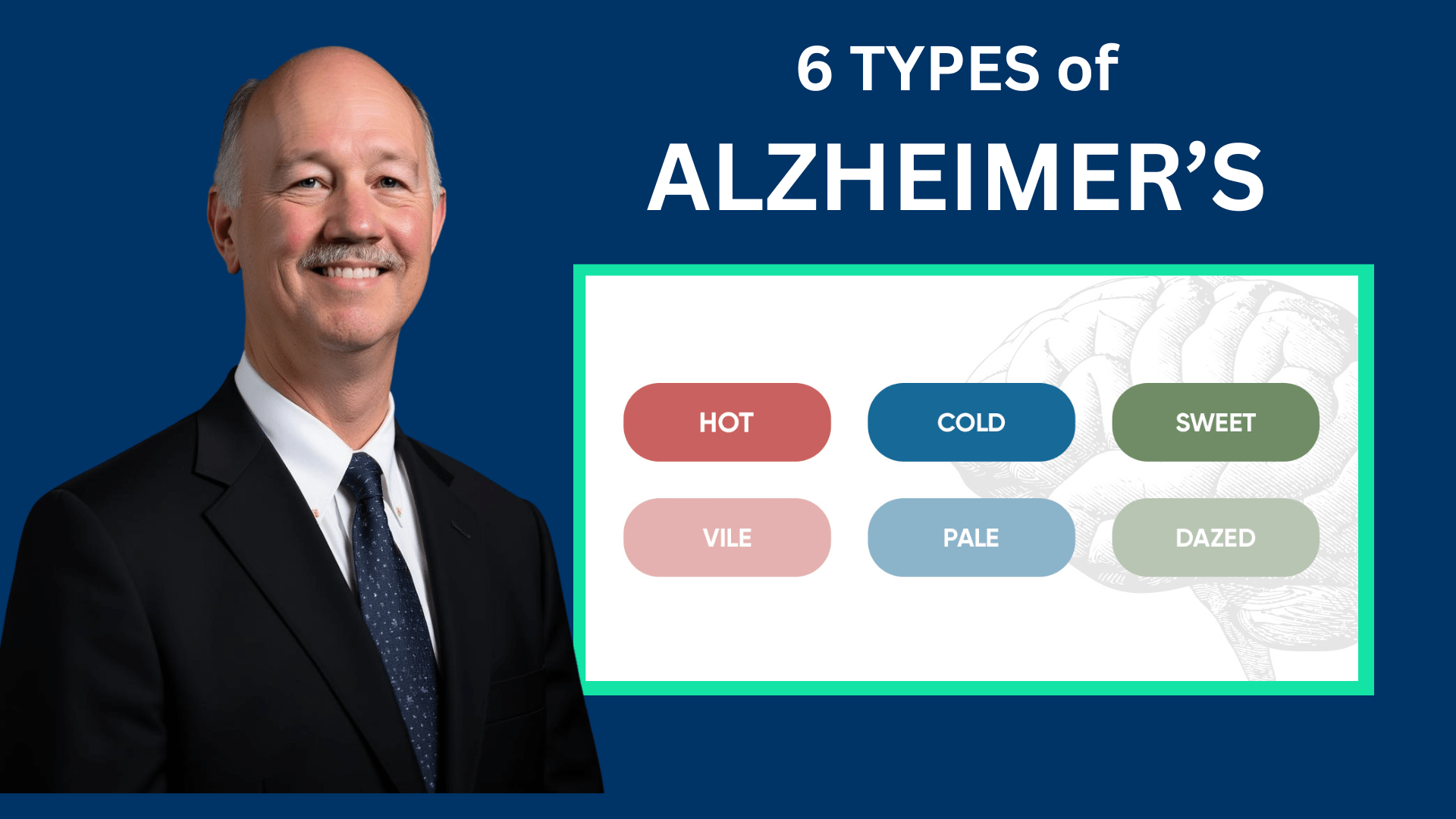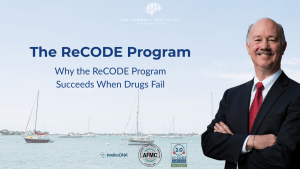The Six Types of Alzheimer’s Identified by the ReCODE Program
Last Updated: October 2025
For decades, most doctors have treated Alzheimer’s disease as if it were one single, mysterious condition. However, research from Dr. Dale Bredesen and the ReCODE Program has changed that understanding completely. Alzheimer’s is not one disease—it’s a collection of distinct biological imbalances that affect each person differently. The ReCODE Program has identified six major types of Alzheimer’s, each requiring a different therapeutic strategy.
At The Carroll Institute, we use this framework to uncover your unique causes of cognitive decline. Once we identify your type—or combination of types—we develop a customized care plan that targets the specific imbalances affecting your brain.
1. Inflammatory (“Hot”) Alzheimer’s
This is one of the most common subtypes and is driven by chronic inflammation. Inflammation can come from infections, gum disease, leaky gut, autoimmune conditions, or even long-term stress. When inflammation becomes chronic, the brain releases protective proteins like amyloid beta, which ironically worsen neuronal communication.
Typical symptoms: brain fog, fatigue, slower recall, and mood changes that worsen with inflammation. Lab tests often show elevated C-reactive protein (CRP) or interleukin-6 (IL-6).
Learn more in our related article: Inflammation and the Inflamed Brain—How Chronic Inflammation Damages Memory.
2. Atrophic (“Cold”) Alzheimer’s
This type results from hormonal and nutritional decline. As we age, levels of estrogen, testosterone, thyroid hormones, vitamin D, and other key nutrients fall. The brain depends on these signals for repair and communication. Without them, neurons begin to shrink and lose synaptic connections.
Typical symptoms: apathy, lack of motivation, decreased focus, and feeling “flat” emotionally. This type often improves dramatically when hormones and nutrients are restored to optimal ranges.
Related reading: How Hormones Affect Brain Function in the ReCODE Program.
3. Glycotoxic (“Sweet”) Alzheimer’s
This hybrid form, sometimes called Type 1.5, involves both inflammation and insulin resistance. Chronically high blood sugar impairs mitochondrial function and causes small-vessel damage. The result is reduced energy production and oxidative stress inside neurons.
Typical symptoms: sluggish thinking after meals, poor memory recall, and fatigue that improves on low-carb or ketogenic diets. This form often overlaps with prediabetes or metabolic syndrome.
4. Toxic (“Vile”) Alzheimer’s
Exposure to heavy metals, mycotoxins, or chemical pollutants can damage neurons and disrupt mitochondrial function. These toxins often accumulate silently for years before symptoms appear. Traditional medicine rarely screens for them, but the ReCODE Program includes advanced testing for mold, mercury, and chemical toxins.
Typical symptoms: anxiety, word-finding difficulty, insomnia, and disorientation—especially in people with a history of mold exposure or environmental illness.
For more, see Toxic Exposures and Brain Health—What the ReCODE Program Reveals.
5. Vascular (“Pale”) Alzheimer’s
When blood flow to the brain is restricted, neurons don’t receive enough oxygen or glucose to function. This type is common in individuals with cardiovascular issues such as high blood pressure, high cholesterol, or clotting disorders. The result is reduced nutrient delivery and impaired waste removal from brain tissue.
Typical symptoms: slower recall, confusion when tired, and difficulty focusing under stress. Addressing circulation and blood vessel health is critical to improvement.
6. Traumatic (“Head Injury–Related”) Alzheimer’s
Head injuries—even those decades old—can trigger inflammation and metabolic dysfunction that mimic Alzheimer’s. This type often coexists with others. At The Carroll Institute, we use Functional Neurology and Photobiomodulation Therapy to help restore connectivity and oxygen flow in affected regions.
Typical symptoms: mood changes, irritability, attention problems, and short-term memory loss following a concussion or trauma.
Why Identifying the Type Matters
Because each subtype arises from different mechanisms, no single drug—or single supplement—can effectively treat all of them. The ReCODE Program’s personalized approach is what makes it so successful. By identifying your specific combination of root causes, we can design a plan that reverses the damage and restores brain health at the cellular level.
"There’s no one-size-fits-all Alzheimer’s. Each patient’s decline follows a unique biological pattern—and that’s why individualized treatment is essential."
— Dr. Garland Glenn
References
- Bredesen DE. Reversal of Cognitive Decline: A Novel Therapeutic Program. Aging (2014).
- Bredesen DE, et al. Rationale for a Multi-Factorial Approach for the Reversal of Cognitive Decline. Frontiers in Aging Neuroscience (2023).
- Bredesen DE, et al. Sustained Cognitive Improvement in Alzheimer’s Disease Patients Following a Precision Medicine Protocol. Biomedicines (2024).
- Apollo Health. Setting the Record Straight: Yes, Cognitive Decline Can Be Reversed (2024).
Medically reviewed by Dr. Garland Glenn, DC, PhD, AFMC (Advanced Functional Medicine Clinician)
The Carroll Institute — Sarasota, FL
About Dr. Garland Glenn
For educational purposes only; not a substitute for medical advice.

Dr. Garland Glenn, DC, PhD, IFM, AFMC
Founder & Clinical Director, The Carroll Institute — Sarasota, FL
Dr. Garland Glenn is a board-certified chiropractic physician and functional medicine practitioner specializing in cognitive health, neurodegeneration, and root-cause medicine. Certified as an AFMC (Advanced Functional Medicine Clinician) and Institute for Functional Medicine (IFM) trained, he has also completed over 500 hours of advanced training in Functional Neurology under Dr. Ted Carrick, founder of the Carrick Institute.
At The Carroll Institute, Dr. Glenn leads Sarasota’s only ReCODE-certified Functional Neurology program, helping patients reverse or prevent cognitive decline through the Bredesen ReCODE Protocol, neuroplasticity exercises, and personalized functional medicine care.
Learn more about his background and approach at About Dr. Garland Glenn.
– schedule now –
free discovery call
To help you get started, we offer a free 20-minute Discovery Phone Consultation. During this call, you will be able to talk with one of our Certified Brain Health Coaches about what going on with you or your loved one and find out if we can help. Please review our FAQs prior to scheduling your free call. We look forward to talking with you soon and helping you Save Your Brain.
(yes, it’s totally free!)
ReCODE® is a registered program developed by Dr. Dale Bredesen and licensed through Apollo Health. Dr. Garland Glenn is a certified ReCODE practitioner.



